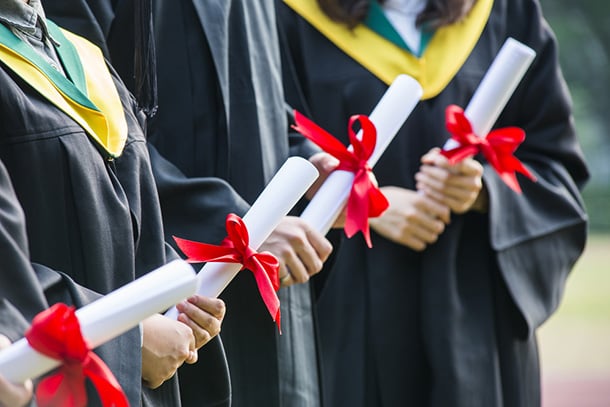Until this past February, any British Columbian student could be put on track towards a school-leaving certificate, also known as an Evergreen Certificate, instead of a high school diploma.
Originally intended to recognize the achievement of special needs students, whose abilities meant they were unable to earn a high school diploma, Aboriginal Grade 12 students have been receiving Evergreens at more than twice the rate of their non-Indigenous peers since 2010/11.
As a result, allegations of "racism of low expectations" have been aimed at districts with high Aboriginal Evergreen rates by the First Nations Education Steering Committee (FNESC), Indigenous leaders, the BC School Trustees Association and the BC Teachers' Federation.
Even B.C.'s auditor general Carol Bellringer recommended last fall that the ministry limit Evergreens to students with special needs who have individual education plans that outlined an alternative education path to that of a high school diploma, more commonly referred to as a Dogwood in B.C.
In February, the ministry complied announcing that districts were no longer allowed to issue Evergreen certificates to students who didn't have individual education plans.
Organizations like FNESC, which advocates for First Nations students on and off-reserve, are pleased with the stricter regulations, one of 23 recommendations the group has for improving Indigenous student outcomes in the province.
But an estimated 60 Aboriginal students without special needs designations are still on track to receive Evergreen certificates. So far, neither the ministry nor individual school districts have announced plans to ensure those students are steered towards a Dogwood, and that no schools give Evergreens to students without education plans again.
"What intensive supports are being provided to ensure [students] leave school with a Dogwood?" said Debbie Jeffrey, FNESC executive director, who spoke about the issue with the auditor general at the Centre for Civic Governance conference in Harrison Hot Springs earlier this month.
"The policy has changed, but in terms of the practice and interventions necessary, how are we ensuring that those are being provided?"
Each district has a different plan
According to the Ministry of Education, district superintendents received emails about the Evergreen change, the changes were announced in newspapers, and all their stakeholders, including trustees, administrators and Indigenous and non-Indigenous education groups were informed the changes were in place.
But the ministry will have to wait until June to see data indicating whether districts are complying, and until September to talk to districts about supporting students without education plans to earn a Dogwood. If those students have left school by then, it could mean getting them into adult education.
Individual districts have their own oversight mechanisms. The Tyee contacted the five districts with the highest Indigenous Evergreen rates: Vancouver, Victoria, Surrey, Prince George and Kamloops-Thompson. Every district -- except Surrey, who couldn't meet our deadline -- had its own way of determining whether a student should be working towards an Evergreen rather than a Dogwood.
Prince George collects its student data twice a year and conducts annual academic achievement and student support services audits to ensure, among other things, that only students with education plans get Evergreens.
Vancouver reviews students' special needs designations annually, and noted that individual education plans are rewritten annually to update for changes. Victoria creates education plans for all its Aboriginal students -- not because of special needs, but to ensure no one capable of getting a Dogwood fails to graduate.
In Kamloops-Thompson, which has an Indigenous graduation rate 10 per cent higher than B.C.'s 63 per cent Indigenous grad average, the district's secondary school completion co-ordinator meets with Grade 12 students to ensure they're on the education path that's right for them.
Parents must give the district permission to issue their child an Evergreen, and if the student lives on reserve, which 14 per cent of the district's Indigenous students do, their band must also be notified.
System review desired
Almost everyone The Tyee interviewed said simply having an individual education plan doesn't preclude students from getting a Dogwood. Some can graduate on time while others may take a more circuitous route, but that doesn't mean they can't graduate.
Even students on track for Evergreens could return to get their Dogwoods some day should their circumstances change.
"You can't say to a child, 'Right now you're in Grade 8, you need to be 5'2" because everybody else in your class is at least 5'2". Why aren't you 5'2"?" said Lisa Carson, Prince George's assistant superintendent. "Learning is like that, too. You can't just go 'everybody else knows how to do this with fractions, why can't you do it?'"
Special needs designations also concern FNESC, because Aboriginal students are overrepresented in that category, too. Thirty-one per cent of Indigenous students were designated as having behaviour disabilities in 2014/15, compared to 20 per cent of non-Indigenous students.
"We've been asking for a review and wanting to have conversations about special education given the overrepresentation of Aboriginal students," Jeffrey said. "I think it's something that we as an overall education system need to be paying attention to."
Such a review isn't coming any time soon. At least not at the ministry level, and districts were divided on whether special needs designations could be biased towards Indigenous students.
That's not good enough for Jeffrey and FNESC, who would like recognition that our education system isn't good at accommodating differences in students.
"Education isn't about equality, it's about equity, and how do we accommodate difference?" she said. "We have to increase the capacity of school districts to support particular populations." ![]()
Read more: Indigenous, Education

















Tyee Commenting Guidelines
Comments that violate guidelines risk being deleted, and violations may result in a temporary or permanent user ban. Maintain the spirit of good conversation to stay in the discussion.
*Please note The Tyee is not a forum for spreading misinformation about COVID-19, denying its existence or minimizing its risk to public health.
Do:
Do not: